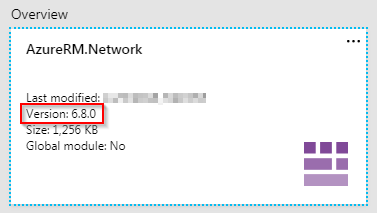AzureRM.Network 0.9 breaks Azure Automation Runbooks

Contents
If you are using Azure Automation and use the AzureRM.Network module in one of the versions from 0.9.0 to min. 0.10.0, you may experience problems running Azure Automation Runbooks.
If the runbooks used are more complex overall, this version may result in a high memory load. If more than 400 MB RAM are used, the runbook ends after three attempts in the status “Suspended”.
Failure
The runbook job was attempted 3 times, but it failed each time. Common reasons that runbook jobs fail can be found here:
https://docs.microsoft.com/en-us/azure/automation/automation-troubleshooting-automation-errors
A downgrade to version 6.8.0 is required. The easiest way, of course, is with PowerShell.
$ModuleName = "AzureRM.Network"
$MaxVersion = "6.8.0"
# Gather information
$AffectedAutomationAccounts = Get-AzureRmAutomationAccount | Get-AzureRmAutomationModule -Name AzureRM.Network | Where-Object {$_.Version -gt $MaxVersion }
# Review
$AffectedAutomationAccounts | Select-Object ResourceGroupName, AutomationAccountName, Name, Version
#region Redeploy
Write-Verbose "Generate RootTemplate.json in `"devopsgallerystorage.blob.core.windows.net`""
$uri = "https://www.powershellgallery.com/packages/$ModuleName/$MaxVersion/DeployItemToAzureAutomation?itemType=PSModule&requireLicenseAcceptance=False"
# This only generates the RootTemplate.json for the specified version. It simulates the Button "Deploy to Azure Automation" on the Gallery
Invoke-WebRequest $uri | Out-Null
# Download JSON
$uri = "https://devopsgallerystorage.blob.core.windows.net/armtemplates/$ModuleName/$MaxVersion/RootTemplate.json"
$templateFileName = ".\RootTemplate.$ModuleName.$ModuleVersion.json"
Invoke-WebRequest -Uri $uri -OutFile $templateFileName | Out-Null
$AffectedAutomationAccounts | ForEach-Object {
$AutomationAccountLocation = Get-AzureRmAutomationAccount -ResourceGroupName $_.ResourceGroupName -Name $_.AutomationAccountName | Select-Object -ExpandProperty Location
$parameters = @{
"Automation Account Name" = $_.AutomationAccountName
"Automation Account Location" = "$AutomationAccountLocation"
"New or existing Automation account" = "Existing"
}
$params = @{
"ResourceGroupName" = $_.ResourceGroupName
"TemplateFile" = $templateFileName
"TemplateParameterObject" = $parameters
"Mode" = 'Incremental'
}
New-AzureRmResourceGroupDeployment @params
}
#endregion